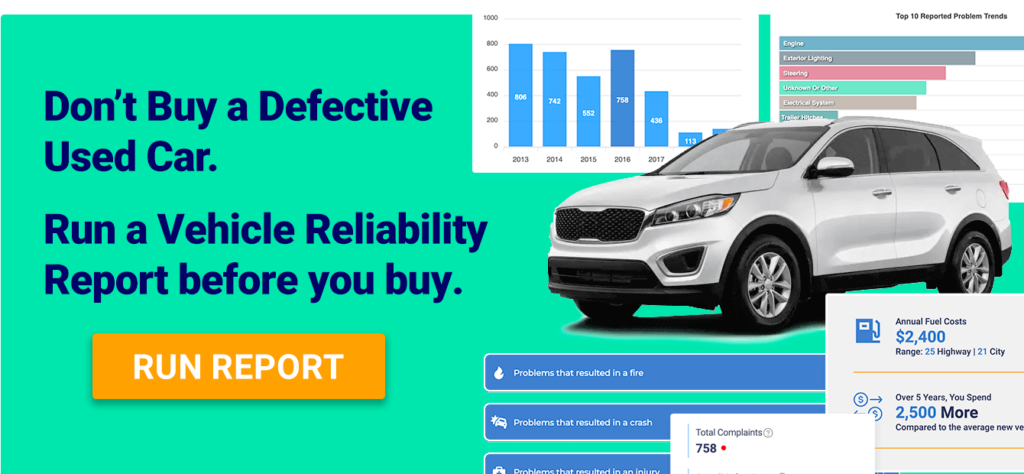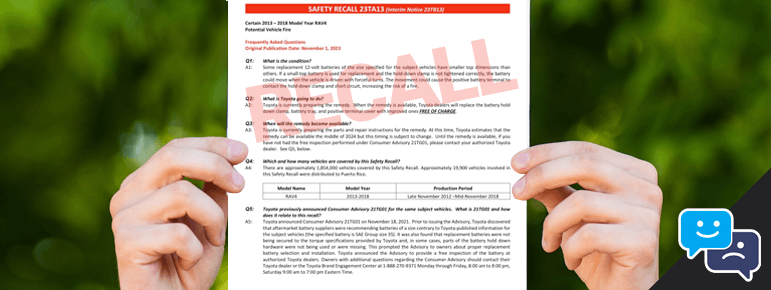Receiving a notification that your car is subject to a recall can be an unsettling experience. Understandably, you want to ensure that your vehicle is safe and reliable. Now before you set up your appointment, you need to ensure you’re armed with the correct car recall questions to inquire about.
Fact is, auto manufacturers issue recalls to rectify defects related to vehicle safety and compliance with federal safety standards. And as a car owner, being informed about why your vehicle is being recalled is the first step in that process.
But truth is, having your car recalled isn’t always as straight forward process as one might seem. You want to make sure you understand how the recall affects the vehicles warranty and resale value.
As a car owner myself, I’ve experienced a range of recalls over the years. And each prompting numerous questions due to their unique complexities.
Some recalls have been straightforward, like a defective glove box latch. Others have been more challenging, such as dealing with corroded suspension components on my Subaru Impreza WRX.
It’s safe to say, knowing the right questions to ask in the beginning is key. Otherwise you may find out later on that the recalled part might not carry the same features or warranty as the part being replaced.
So, to assist vehicle owners in this process, we have assembled the essential questions to ask your car dealership to help navigate through a recall seamlessly.
Let’s jump into this!
Navigating a Recall: Key Questions to Pose About Your Car’s Recall
Alright, let’s start by figuring out just how serious this car recall really is. Should you be hitting the brakes on driving it altogether? Or maybe it’s safer to avoid cozying it up in your garage for now?
Typically, the recall letter will come right out and say “do not drive,” or “park your vehicle outside away from structures.”
You want to make sure you adhere to all guidelines and instructions provided in the recall notice.
But it’s important to dive into the details of the recall notice. This will help you fully understand all the nitty-gritty details and ensure you’re keeping yourself and your passengers out of harm’s way.
What is the recall for, and how does it affect my vehicle’s safety or performance?
The primary concern of any recall is safety. Understanding the specific defect and its potential impact on your vehicle’s performance and safety is important.
Truth is, whether it’s an issue with the airbags, brakes, steering, or any other critical component, knowing the details will help you gauge the urgency of the repair.
Will the recall affect the vehicles resale value?
A car recall can indeed affect its resale value, with the impact depending on the recall’s severity, how well it’s resolved, and the manufacturer’s reputation.
Typically, vehicles recalled for minor issues experience no significant impact on their resale value. While those recalled for serious safety defects could experience a notable decrease in value.
Once such example was in 2015, Volkswagen faced a major setback when it came to light that millions of its diesel vehicles were equipped with software designed to cheat on emissions tests.
This scandal not only prompted a massive recall but also severely tarnished the brand’s reputation and led to substantial legal and financial consequences.
As one can imagine, the resale value of affected Volkswagen vehicles, particularly those with diesel engines, plummeted as consumers grew wary of their performance and environmental impact.
Ultimately, the brand’s history with recalls and the public’s perception significantly influence a car’s resale value post-recall.
Is this recall a result of government safety standards non-compliance or an internal decision by the auto manufacturer?
Recalls can be initiated by either the National Highway Traffic Safety Administration (NHTSA) following safety standard violations, or by the manufacturer as a proactive measure. The origin of the recall can provide insight into the severity and urgency of the issue.
Usually, an automobile manufacturer becomes aware of a defect only after a significant number of vehicles have been on the roads for some time. In many cases, it requires complaints from owners to expose a widespread defect in the vehicle.
Assessing Urgency and Severity
Assessing the urgency and severity of the car recall—is immediate action necessary, or can it wait? This is a big one to pay attention to. Don’t overlook this detail when communicating with the car dealership service.
Moreover, inquire about the availability of the defective part. Will it be available, or will you have to wait. And if their is a wait, for how long?

How urgent is this recall? Is it safe to continue driving the car until the repair is made?
Some recalls require immediate action, while others might be less urgent. However, knowing the risk of continuing to drive the vehicle before it’s fixed is key to your safety.
Have there been any incidents or accidents reported that are related to this recall?
Knowing whether there have been any reported incidents can help you assess the recall’s severity and make an informed decision about using your vehicle before it’s repaired.
For example, in light of the KIA car theft issue, owners found themselves urgently seeking effective measures to safeguard their vehicles until KIA released a fix.
Many turned to solutions like The Club. That’s right–the popular theft deterrent from the 90’s!
KIA eventually in February 2023 released a free software update to help combat the epidemic rash of thefts. But owners understood the risks for continuing to use these vehicles until a fix was released.
Understanding the Repair Process
Understanding the specifics of the necessary fixes and their implications is important for ensuring your peace of mind. From identifying the nature of repairs, to gauging the time frame and potential costs involved.
What specific repairs or replacements will be made to my vehicle?
Clarify the nature of the repair or replacement parts needed. This ensures you’re aware of the work being done on your vehicle, and which parts being replaced.
For instance, do the replacement parts adhere to OEM specifications and come with their own warranty? If not, inquire with the dealership service manager for clarification.
Additionally, ensure that you obtain the comprehensive work order detailing all necessary parts and fluids essential for executing the recall repair.
Will there be any cost to me, and how long will the repair take?
In most cases, manufacturers will cover the cost of recalls related to safety for the entire lifespan of the vehicle.
However, understanding the time frame needed to make the recall fix can help you plan accordingly, especially if you need to arrange for alternative transportation.
Truth is, the timeline for fixing a car under recall can vary widely. Once a recall is announced, your local dealership might need a bit of time to get everything in place to start repairs. This is especially true when needing to source parts.
Typically, fixing the issue doesn’t take too long—often just a few hours, especially if it’s a minor issue or something that can be resolved with a quick software update.
However, for more complex problems, the repair time might extend. For example, if the parts are on global backorder. Or, if the problem is severe enough to require sending the car back to the manufacturer.
Unfortunately, you could be looking at a longer wait, potentially weeks or even months. In rare instances, if the car cannot be fixed, the manufacturer might offer to replace or buy back the vehicle.
One such example was in 2015, Fiat Chrysler, now part of Stellantis, made an agreement to buy back many vehicles after the National Highway Traffic Safety Administration (NHTSA) raised safety concerns.
This involved some Ram trucks that had issues with steering and axles, which could cause drivers to lose control.
Loaner Vehicle and Warranty
Among the inquiries frequently posed to us at CarVoice, one stands out: ‘Will I be provided with a loaner car?’ You need to make sure your transportation needs are met.
It’s best to never assume that the dealership will provide a loaner, especially since many auto dealers are experiencing inventory challenges.
Will a loaner vehicle be provided if the repair takes longer than a day?
For extended repairs, many dealerships offer loaner vehicles. Knowing the dealership’s policy on this can save you inconvenience and transportation costs.
Will this repair affect my vehicle’s warranty in any way?
It’s important to understand how the recall repair might impact your vehicle’s existing warranty, or if it extends the warranty on the repaired parts.
Precautions and Future Measures
What can I do to ensure my vehicle does not have similar issues in the future?
Asking for advice on preventative measures can help you maintain your vehicle’s safety and reliability post-repair.
Will there be any future inspections or services required post-repair?
Sometimes, additional inspections or services might be recommended to ensure the issue is fully resolved. Knowing this can help you plan for future maintenance.
Staying Informed and Documentation
Who can I contact for updates or questions regarding the recall and repair status?
Having a direct contact at the dealership for updates or concerns can make the recall process smoother and less stressful.
Can I have written confirmation of the recall repair for my records?
Obtaining documentation of the recall repair is crucial for your records, especially for future resale or service warranty claims.
Final Thoughts
A vehicle recall can be a significant concern, but being proactive and informed can help mitigate risks and ensure your vehicle is repaired efficiently. Asking the right car recall questions not only ensures your safety but also helps maintain your vehicle’s integrity and value.
Remember, manufacturers and dealerships are responsible for ensuring recalled vehicles are fixed at no cost to the owner.
By staying informed and keeping a record of all communications and services related to the recall, you can navigate this process with confidence and ease.
We hope this article has provided valuable insights into your car recall queries. If you still have questions or need further assistance, please don’t hesitate to leave a comment below.

Managing Editor
Christopher is an automotive technical writer. When he’s not at the local autocross event, he can often be found working on one of his cars. Specializes in automotive class action law, industry trends, and automotive maintenance. Email me direct, or learn more about us

